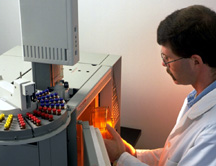 Purdue News
Purdue News
 Purdue News
Purdue News
February 1998

|
"It's one of the few places entrepreneurs or small businesses can go for 'angel money,' or startup capital that doesn't have to be paid back," says John A. Schneider, director of the Purdue Office of Industry Research and Technology Programs. "Entrepreneurs are partnering with universities to create new products and services, particularly in the business 'incubator' parts of the country, like the coasts and parts of Michigan, the Carolinas, Georgia, Utah and Texas."
Schneider says anyone with a small business (fewer than 500 employees) or an idea for a product can apply for a grant from participating government agencies such as the Department of Defense, the National Institutes of Health or NASA.
For example, someone with an idea for a new kidney dialysis machine might seek the grant from the appropriate health and human service-based government agencies.
"You don't necessarily have to be partnered with a university to receive these small business innovative research grants, but it sure helps," Schneider says. "And the Small Business Technology Transfer grants do require a university research partner.
"Because of that, we're starting to see an increase in new business startups among university faculty members. And that's a winning situation for everyone. The faculty member is able to market a new technology or invention while providing 'real world' research opportunities for university staff and students. The local economy benefits from the creation of new jobs, and the global community benefits from groundbreaking medical and technology-based research."
An example of the impact the grants and university partnerships can have on small business, Schneider says, is Bioanalytical Systems Inc. in West Lafayette. It was started by Purdue chemistry Professor Peter T. Kissinger in 1974 while he was teaching at Michigan State University.
"I started the company with $365, and a handful of research assistants in Michigan," Kissinger says. "In 1975, I accepted a professorship with Purdue and moved the entire lab to West Lafayette in a U-Haul truck. We began by manufacturing measurement devices for electrochemical research done in the laboratories of pharmaceutical companies, medical schools and clinical laboratories. Now we have about 30 active medical diagnostic products on the market and are helping to test drug therapies for a variety of health concerns, including children's illnesses, HIV and Alzheimer's disease."
Kissinger and his staff initially worked part-time out of his and his co-workers' apartments. The first year's sales were around $17,000. In 1976, Kissinger bought a house, and his garage became the laboratory for about 25 staff members.
In 1979, Bioanalytical Systems moved into its own 10,000-square-foot building at the Purdue Research Park, a business incubator site. Since then, the company has received a number of Small Business Innovative Research and Small Business Technology Transfer grants totaling more than $2 million; increased its square footage to 110,000; and finished 1997 with more than $16 million in sales. The company's initial public stock offering in November raised $10 million, which will be used to retire debt, expand facilities and increase marketing efforts.
"Since receiving the first $50,000 grant in 1986, I know we've paid far more back in taxes," Kissinger says. "And we've employed 200 people, 40 of them with advanced degrees. Our story is a classic example of the government helping to fund a 'high risk' business venture. Research and products that will serve smaller 'niche' markets, generating only a few million dollars per year, are simply unattractive to banks and other potential investors. And large corporations aren't going to enter those markets either."
The grants are given in two phases, with recipients receiving up to $100,000 for phase one to explore the scientific, technical and commercial feasibility of an idea or technology. The phase two award can be up to $750,000 and is for more detailed research and development. Entrepreneurs must then find private sector funding for phase three to bring the product or technology to market.
Sources: John Schneider (765) 494-0743; e-mail, jaschneider@sps.purdue.edu
Peter Kissinger (765) 463-4527; web, https://www.bioanalytical.com
Writer: Kate Walker (765) 494-2073; e-mail, kate_walker@purdue.edu
Purdue News Service: (765) 494-2096; e-mail, purduenews@purdue.edu
PHOTO CAPTION:
Scott Hessong, a scientist at Bioanalytical Systems Inc. in West Lafayette, uses a
gas chromotography instrument developed by the company. The business, started on
a shoestring in 1974, had $16 million in sales in 1997 thanks to a partnership between
Purdue University and its founder. (Bioanalytical Systems photo)
Color photo, electronic transmission, and Web and ftp download available. Photo ID:
Schneider.Bioanalytical
Download here.
 To the Purdue News and Photos Page
To the Purdue News and Photos Page